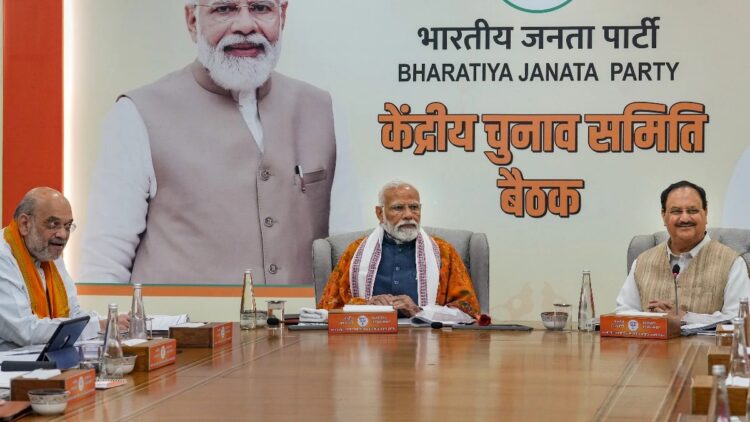The Bharatiya Janata Party (BJP) has revealed its inaugural list of 195 Lok Sabha candidates, spanning 16 states and two Union Territories. This announcement comes in the aftermath of a lengthy meeting conducted by the party’s Central Election Committee (CEC), presided over by Prime Minister Narendra Modi.
Prime Minister Modi is set to contest from the Varanasi constituency for the third consecutive term, highlighting the party’s confidence in his leadership. Among the 195 candidates, the list encompasses 34 Union Ministers and Ministers of State (MoS), along with two former Chief Ministers.
In the Central Election Committee (CEC) meeting, the ruling party planned to give more time for election campaigning to candidates who didn’t win in the last election. They also assigned specific people to take charge of these areas they consider as “weak.” In Uttar Pradesh (UP), Sunil Bansal, the BJP General Secretary, is putting extra effort into the seats the party lost last time, as per an unnamed source from the party.
The BJP is feeling hopeful about winning in these areas due to recent events like the Ayodhya Ram temple inauguration, the Rashtriya Lok Dal deciding to join their alliance, and a weaker opposing party compared to the last election. It’s important to note that in the previous elections, the BJP won 62 out of the 78 Lok Sabha seats they competed for in UP.
Highlighting the party’s proactive approach, a BJP functionary pointed out that, similar to the Assembly elections in Madhya Pradesh and Chhattisgarh, the BJP has announced its Lok Sabha candidates well in advance. This move is seen as a demonstration of the BJP’s discipline and strong leadership.
In UP, the state with the highest number of Lok Sabha seats (80), the BJP is anticipated to reserve two seats for the Rashtriya Lok Dal. Notably, the RLD supported the BJP’s eighth candidate in the recent Rajya Sabha elections, leading to the defeat of the Samajwadi Party’s third candidate. Additionally, the BJP is expected to leave one or two seats for the Apna Dal (S), one for the Suheldev Bharatiya Samaj Party (SBSP), and one for the NISHAD Party.

















Comments